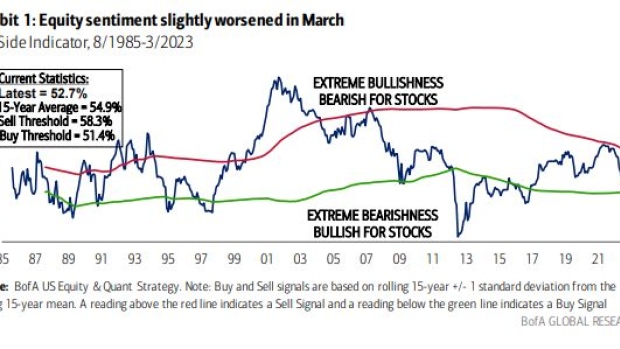Apr 3, 2023
Sentiment Toward Stocks Hasn’t Been This Bad in Years, Bank of America Says
, Bloomberg News

(Bloomberg) -- Fears of an economic downturn evoked by bank collapses have turned Wall Street’s attitude toward stocks the most negative in several years, according to Bank of America.
That may be a reason for equity bulls to celebrate: BofA’s so-called “sell side indicator” — which tracks asset allocations recommended by strategists at various firms — is after sliding in March now close to a level that signals stocks are a “buy.”
“Wall Street’s consensus equity allocation has been a reliable contrary indicator,” BofA strategists led by Savita Subramanian said Monday in a note to clients. “In other words, it has been a bullish signal when Wall Street strategists were extremely bearish, and vice versa.”
While at 52.7%, it’s currently still in “neutral” territory, the metric — which measures the average recommended allocation to stocks — has tumbled seven percentage points since peaking in 2021. That decline suggests worries about stocks are “well-aired,” and a positive surprise is more likely than a negative one, the BofA team said.
Even so, other firms are warning stocks have room to fall after a swift rally over the last two weeks.
Morgan Stanley’s Michael Wilson — among Wall Street’s most bearish voices — cautioned the recent rally in technology shares that lifted the Nasdaq 100 into a new bull market last week is unsustainable.
And Stuart Kaiser, head of US equity trading strategy at Citigroup Global Markets, said Sunday in a note that last month’s stock-market surge was a distraction from important shifts in economic data, the monetary policy outlook and risk premiums that “leave little room for positive surprise and lots of space for disappointment,” adding that regional bank issues remain unresolved.
Another 1.3 percentage-point slide in BofA’s sell-side indicator would trigger a “Buy” signal, according to the firm’s strategists. But even current levels or lower have generated positive returns for the S&P 500 over the subsequent 12 months 94% of the time, with a median gain of 22%, they said.
©2023 Bloomberg L.P.





